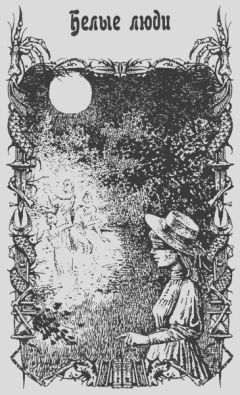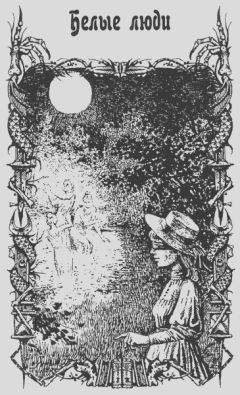Barbara Hambly - Dead water
“From Philadelphia, is he?” asked January.
“Lord, yes. You ever hear a man say ‘ah' for ‘o' like that who wasn't? He clerks for a firm that brokers sugar, cotton, an' tobacco in Cincinnati, makes two-three trips a year on the river, which is how he knows Mr. Tredgold—Mrs. Tredgold can't get enough of him. Myself, pretty as he is, I'd think a lot more of him if he did somethin' about slavery besides just goin' around sayin' how bad it is. I already know that.”
An innocuous and well-known personage, then, thought January, following the nurse as she climbed the stairs in a rustle of petticoats to resume her position at the bedside of her wretched little charges. The door of the Saloon stood open, throwing light out into the humid darkness. Someone—Thu, probably—went into the Ladies' Parlor and lit a single oil-lamp there, anticipating that even had Hannibal not been in disgrace with the rest of the passengers, there would be no after-supper dancing.
Rifle on his arm, Mr. Roberson walked along the upper promenade, peering at the matte-black cut-out of the shore. Looking up at the hurricane deck above, January glimpsed a black shape that had to be Lockhart, silhouetted against the stars.
Quince came from Philadelphia.
Co-incidence?
January shook his head. A lot of people presumably came from Philadelphia, and because that city was one of the business centers of the United States, it wasn't odd that they'd find their way to New Orleans.
Still . . .
Molloy's voice bawled an order, on the bow-deck by the sound of it. He was on watch till midnight, and probably longer, since the Silver Moon would be getting under way again at about that time. Just as well, thought January. The last thing they needed was for Molloy to glimpse Miss Skippen making her way along to Hannibal's room.
I have important news to impart.
A trick? An excuse to get into Hannibal's room so she could throw herself into his all-too-susceptible arms?
Some variation of the badger game?
Voices floated down after him as he descended again to the galley. The ladies emerged from the Saloon, chatting softly as one and then another disappeared into the ladies' toilet: “Dearest, would you like a little company in your stateroom?” trumpeted Mrs. Tredgold in a voice that she probably thought was gentle and confidential. “I can come sit with you—I have some of the finest China green tea, much better than the horrid stuff they use in the galley—I've told Tredgold and told him. . . .”
January leaned against the corner of the passway and took Rose's hand.
Hannibal tactfully faded into the darkness.
“Don't I know you from somewhere, sir?” asked Rose diffidently, and January settled down on the box at her side.
“My face is familiar,” sighed January, “but I can't quite place my name.”
“It looks like it should be Joe, or Jim, or maybe Pete. . . .”
And the two of them dissolved into giggles.
An hour or so later, January took his place on the wide bow apron of the upper deck. The lamp in the Ladies' Parlor had been put out, but a few still burned in the Saloon, where Quince and Lundy played cribbage. January caught the names of William Lloyd Garrison, and Henry Clay, and of the Colonization Society. He glanced down the promenade toward Hannibal's stateroom, wondering if Miss Skippen would approach from the bow end or the stern, and whether, if she passed him here on the bow, he could remain unobtrusive by simply standing away from the lanterns. At six feet three he was not the most unobtrusive of men. . . .
“Benjamin.”
Colonel Davis emerged from the door of the Saloon. January inclined his head respectfully, and after a moment's hesitation, the young planter came to his side.
“Benjamin, I regret to say I have been making inquiries pursuant to your case—” The corner of January's mouth twisted a little at the way it had become his case, and not Hannibal's—
“—and I must say I am becoming extremely troubled.”
YOU are becoming troubled??? Sir.
“I have inquired of the whereabouts of every person on this boat, and you are one of very few who cannot account for his movements at or about midnight last night. Now, I don't say this to worry you,” the Colonel added, raising a preemptory hand although January had made no attempt to interrupt. “I am much inclined to believe that you were where you say you were, in spite of Mr. Molloy's insinuations to the contrary. The man is a blackguard, a braggart, and a scoundrel . . . but a scoundrel who was in the presence of a witness when Mr. Weems met his end. And of those who have no alibi for the material time, you are the only one who seems to have had a connection with Mr. Weems.”
“I'm the only one whose connection can be proven so far, sir,” replied January slowly. “And you're right in that a man of my race will always be blamed before a man of yours—you know that's the way of the world.” At least it is in this country, he wanted to add but didn't. But he saw in Davis's eyes the acknowledgment of his tribute to the planter's worldliness.
Davis said, a little to January's surprise, “I won't desert you. Whomever else the sheriff decides to detain in Mayersville for his investigation, I plan to leave the boat and remain as a witness, to make sure that justice is served.”
“Thank you, sir,” said January, and wondered how much further into his confidence he could take this stiff-necked and arrogant young man, and whether Colonel Davis might be prevailed upon, instead, to remain on the boat as some kind of assistance for Rose. “I've been asking questions, too. . . . Were you aware that Mr. Quince, who also lacks an alibi, comes, like Weems, from Philadelphia?”
Davis looked surprised. “Where heard you that?”
“I understand it was spoken of in the Ladies' Parlor as common knowledge. Since both Weems and Mr. Quince dabbled in Abolitionist circles, it isn't impossible that they knew one another there. I understand also—though this is only hearsay and I'm sure he will deny it—that Mr. Lundy went to considerable trouble to come up-river on this particular boat, and appears to have been less than truthful about his reasons for doing so: the doctor he claims to be going to see in Lexington doesn't exist. And I'm not sure if you know that Mr. Weems was blackmailing Mr. Cain.”
“Blackmailing?” Davis's sparse, jutting eyebrows flicked upward, and the side of his face twitched. “That is a very serious charge to make on hearsay.”
“It isn't hearsay, sir. I heard Weems threaten Cain with exposure of some secret, the night Cain came on board at Donaldsonville.”
Davis was silent, stroking his wispy beard for a time. Then he glanced up at January. “That may be true—I have no way of knowing—but Mr. Cain was with Mr. Gleet the entire night.”
“Doesn't that in itself strike you as a little odd, sir?” asked January diffidently. “Considering that Cain generally avoids Gleet?”
“Everyone avoids Gleet,” agreed Davis. “The man is an excrescence, and I won't permit him on my place, for all he comes around two or three times a year trying to buy slaves or sell them—pah! A human mollusk.” His sharp voice was shrill with distaste. “The worst of a bad class, of whom even the so-called best suffer by comparison to the average hound dog.”
“Do you know why Cain detests Gleet the way he seems to?”
“I can't imagine any gentleman of taste who wouldn't.” Davis frowned, as if realizing that Cain by definition did not fall into that category. “As for Cain, I don't know him or anything about him—he's new on the river. But it's curious that he would have paid Weems money at the threat of exposure, being already, as it were, the most despicable form of life known to man. Unless . . .” A look of momentary enlightenment flickered across the sharp features, then passed into a look of calculation, and the idea he'd scouted—almost certainly, January guessed, the possibility that Cain might himself be part African—was dropped.
It was a concern—and a cause for blackmail—everywhere in the South, where a man ran the risk of ostracism and possible enslavement if proven to bear even the smallest proportion of African blood in his veins: more than one murder had been committed in New Orleans to conceal just such information.
But a more Saxon product than the hawk-nosed Jubal Cain was hard to picture. The supposition was simply absurd.
Which left them where?
Bredon, Weems had called Cain.
Printed in the Mayersville Gazette.
What possible social consequences would threaten a man who was already a slave-dealer?
Striding footfalls shook the stairs that led down from the pilot-house. January whipped around as Molloy shoved past him, a pistol in his hand. He nearly ran down the promenade, January pelting at his heels, cursing himself for not finding a way to watch Hannibal's door during his talk with Davis—January and Davis had not quite caught up with the infuriated pilot when he reached Hannibal's door, yanked it open . . .
The lamplight within showed them all Theodora Skippen leaning against Hannibal and grasping his lapels, while Hannibal, backed to the wall, attempted to disengage her grip.
As the door was ripped open, Theodora whirled, mouth and eyes widening to a series of perfectly round O's; Hannibal began, “Sir, it isn't—”
“God damn you, if it isn't what it looks like, what is it, then?” bellowed Molloy, grabbed Hannibal by the front of his coat, hauled him from the room, and showed every sign of heaving him over the rail and into the river had not January and Davis both intervened.
Molloy thrashed against their grip, shouting curses—when Hannibal, with a sad lack of gallantry, dragged Theodora's note from his coat pocket and held it out, the pilot simply crushed it in his fist and hurled it overboard: “You don't think I don't know the bitch can't write? Nor read—she had to get someone to read her this. . . .”
He slashed Hannibal across the face with a sheet of notepaper and, when Hannibal took it, followed up the blow with the back of his hand. “And don't you be pretending you don't know what's there,” snarled Molloy. “Now, sir, it's insulted me you have and done murder on my boat, and this time I will have satisfaction! You name your friends if you've got any!”
Hannibal probably could have gotten out of it with another abject apology—January had seen him wriggle out of worse—but Colonel Davis, face jerking with his tic, stepped forward and snapped, “You, sir, are a boor and a commoner, and I take it as an honor to stand as Mr. Sefton's friend.”
“Non tali auxilio nec defensoribus istis tempus eget,” said Hannibal sadly, and Davis, ignoring him, went on.
“I take it that it shall be pistols at dawn?”
“It shall, and here the boat shall stand until we've had this out once and for all,” shouted Molloy. “And you, surgeon—or surgeon's nigger”—he jabbed a finger at January—“you'd better be ready to take a bullet out of your master's thieving Ulsterman heart.”
Curious, January bent down as Molloy seized Theodora by the wrist and went storming off toward the bow, Theodora gasping, “Oh, how I am undone! He deceived me, drew me into the room with lies. . . .”
The note said:
Beloved,
I have tried to put you from my heart, but I have failed. I can no longer live without your kisses. Please, please, come to my stateroom at ten.
Your own,
Hannibal
January could tell the difference, but the handwriting was an excellent facsimile of Hannibal's own.
SEVENTEEN
So eager was Colonel Davis that someone should stand up and take a shot at Kevin Molloy that he was very little use as a second. “The man is a boor and a swine,” he announced decisively at the War Council that took place in Hannibal's stateroom minutes after Molloy's departure with Theodora in tow. “You're a gentleman, Sefton. You should be able to out-shoot him with ease.”
“Ah.” Hannibal took a long, shaky swig of opium-laced sherry. “A fact which entirely slipped my mind in the excitement of the moment . . .”
“Brace up, man! Surely you aren't thinking of backing out?”
“I have the feeling that I backed in. . . . As challenged, mine is the choice of weapons, I believe? And conditions?”
The door opened without the smallest vestige of a knock. It was Gleet.
“Molloy asks, what'll you have?”
Davis's sensitive nostrils flared like a spurred thoroughbred's at this display of arrogance from a man he despised. “Pistols at twenty paces!” he snapped before Hannibal could open his mouth to suggest shuttlecocks at a hundred yards. “And you can tell that bog-Irish blackguard that he should consider himself fortunate that gentlemen of blood would consider going out with him at all!” He turned back to Hannibal as Gleet left in an offended huff. “I applaud your chivalry of heart, sir, in trying to help the young lady, but I fear she is scarcely worth a gentleman's assistance.”
“I actually deduced that some time ago,” responded Hannibal, taking another drink only to have Davis remove the flask from his grip. “I didn't write that note.”
“The minx wrote it herself, then,” said Davis serenely. “She's doubtless lying herself to perdition at this moment. . . .”
“I'm the one who's going to end up being lied to perdition. . . .”
“Nonsense, man,” said Davis. “Buck up! No rabble can shoot straight. You'll do splendidly.”
“Who do you think did it?” asked Hannibal after Davis strode off, a-bristle with righteousness, to further confer with Gleet and locate pistols. The fiddler's hands were shaking as he uncapped his laudanum-bottle. Then he glanced at it and re-capped it, and thrust it at January. “Don't let me have that again.” He took it back, took one last quick drink, and pressed it into January's hand. “My money's on La Pécheresse. I'll bet she's got a pretty skill at forgery, and she'd welcome the chance to have me laid out on the floor next to her dear departed.”
“You aren't going to go through with it?”
“Do you think I'd get far ashore? You and I go over the side, they'll have posses after us for the murder before you can say Issaquena County. . . . And where does that leave Rose? Here on the boat alone? Or announcing her complicity by fleeing with us?”
“Where does that leave Rose—or myself—if you get killed and Davis hands me over to the sheriff at Mayersville . . . if I make it to Mayersville, with jackals like Gleet and Cain aboard? Completely aside from the loss of your friendship . . .”
“I'm sure there are plenty of other drunken wastrels in the world for you to choose from if you really miss my company,” retorted Hannibal bitterly.
“None that play the fiddle as well as you, though.” Rose stepped through the stateroom door and shut it behind her, and, putting her arms around Hannibal's neck from behind, kissed the bare scalp in one of the long fjords of his hairline. “And if you were killed, with whom would I make jokes about the Dialogues of Plato? Run for it. Both of you. I can at least stay long enough to see what La Pécheresse does next. . . .”




